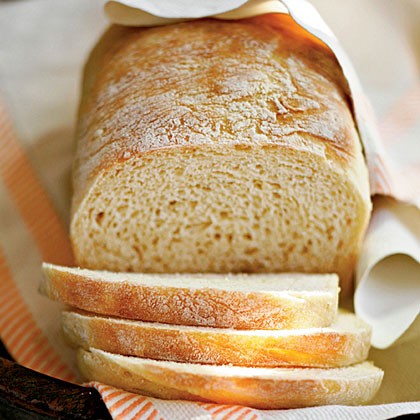An argument for unbleached flour
May 19, 2016 by Darcie
A few days ago we posted about a pastry chef who only uses bleached flour for cakes. Today we look at a counterpoint (of sorts), this time from Cooking Light Magazine, which advocates ditching bleached flour for unbleached.
The crux of the Cooking Light article is that the reason flour is bleached is because it benefitted large-scale commercial bakeries who needed a very consistent product. Before baking occurred on a such a massive scale, flour would naturally be “bleached” through oxidation, which occurs 1-2 months after grinding the wheat into flour. Cooking Light explains that unlike “farm-to-table garden goods, best when hot off the vine, freshly milled “green” flour isn’t the most ideal for baking. The gluten in wheat flour needs time and oxygen to develop and mature, resulting in a stronger, more elastic dough… and lighter, fluffier product. Also with age, the flour naturally becomes whiter and paler.”
Chemicals – either potassium bromate or chlorine gas – replaced the natural aging process and made the flour much whiter. Potassium bromate fell out of favor after bromates were linked to cancer in laboratory animals in the 1980s. The chemical is banned in Europe and Canada, but is still allowed in the US, although the FDA has encouraged producers to stop using it. In California, products that contain potassium bromate must carry a warning label. In other states, look for the term “unbromated wheat flour” if you want a product without bromate.
The article asserts that most home bakers won’t notice any difference if they switch to unbleached flour. “The difference between bleached and unbleached flour is basically indiscernible to the home baker,” says Sharon Davis of the Home Baking Association. She claims that “the bleaching process helps commercial bakers with consistency. Spread, texture, volume, and quality of grain must be exact each and every time… but for the home baker, the only thing bleach has to offer is a whiter bread or cookie.” The caveat is that there is no mention of whether unbleached flour will negatively affect cakes, the main point of the previous article about using bleached cake flour.
Photo of Monday morning potato rolls and bread from Cooking Light Magazine
Categories
- All Posts (6940)
- Antipasto (2135)
- Author Articles (247)
- Book News (935)
- Cookbook Giveaways (983)
- Cookbook Lovers (257)
- Cooking Tips (109)
- Culinary News (299)
- Food Biz People (552)
- Food Online (791)
- Holidays & Celebrations (272)
- New Cookbooks (149)
- Recipes (1500)
- Shelf Life With Susie (231)
- What's New on EYB (133)
Archives
Latest Comments
- Atroyer7 on Danube Cookbook Review and Giveaway
- demomcook on What foods do you look forward to the most for each season?
- demomcook on Danube Cookbook Review and Giveaway
- Darcie on How cookbooks can help build resilience
- mholson3 on Danube Cookbook Review and Giveaway
- Rinshin on How cookbooks can help build resilience
- sarahawker on Danube Cookbook Review and Giveaway
- Sand9 on Danube Cookbook Review and Giveaway
- hankintoby29 on Heritage Cookies of the Mediterranean World – Cookbook Giveaway
- WBB613 on Feasts of Good Fortune Cookbook Giveaway